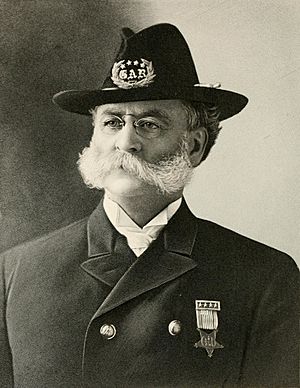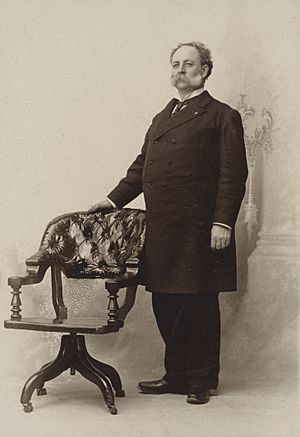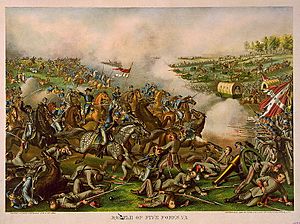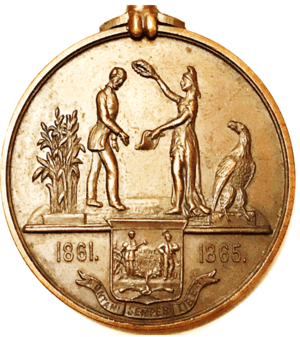Wilmon W. Blackmar facts for kids
Quick facts for kids
Wilmon Whilldin Blackmar
|
|
|---|---|
 |
|
| Born | July 25, 1841 Bristol, Pennsylvania |
| Died | July 16, 1905 (aged 63) Boise, Idaho |
| Buried |
Cedar Grove Cemetery, Dorchester, Massachusetts
|
| Allegiance | United States of America |
| Service/ |
U.S. Army (Union Army) |
| Years of service | 1861 — July 8, 1865 |
| Rank | Captain |
| Unit | |
| Battles/wars | American Civil War: |
| Awards | |
| Other work | Lawyer |
Wilmon Whilldin Blackmar (born July 25, 1841 – died July 16, 1905) was an American military officer. He fought for the Union Army during the American Civil War. He was part of the 15th Pennsylvania Cavalry and the 1st West Virginia Cavalry.
Blackmar received the Medal of Honor, which is the highest award for bravery in combat. He earned it for his amazing courage during the Battle of Five Forks on April 1, 1865. He bravely led his troops forward against the enemy. His award was given to him on October 23, 1897.
After the war, he advised several governors in Massachusetts. He also became the leader of the Grand Army of the Republic (a group for Civil War veterans) from 1904 to 1905. When he died in 1905, he was only the second person in Massachusetts history to have his body honored at the Massachusetts State House in Boston.
Contents
Early Life and Education
Wilmon W. Blackmar was born on July 25, 1841, in Bristol, Pennsylvania. His father, Rev. Joseph Blackmar, was a clergyman from Massachusetts. His mother was Eliza (Philbrick) Blackmar.
When he was young, his family moved to Boston, Massachusetts. He went to school there at Brimmer Grammar School. He also attended the State Normal School in Bridgewater. Later, he continued his studies at Phillips Exeter Academy in Exeter, New Hampshire.
Fighting in the Civil War
In the summer of 1862, during the second year of the Civil War, Wilmon Blackmar left school to join the army. He signed up in Philadelphia on August 22, 1862, when he was 21 years old. On August 30, he officially joined Company K of the 15th Pennsylvania Cavalry. This unit was also known as the "Anderson Cavalry." He then took part in many operations with the Army of the Potomac.
After fighting in the Battle of Antietam on September 17, 1862, he was promoted to corporal. On March 1, 1863, he became a sergeant. Then, on May 5 of the same year, he became a first sergeant. He fought with the 15th Pennsylvania Cavalry in the Chickamauga Campaign from August 21 to September 20, 1863. During this time, he was part of a famous charge against Confederate States Army troops in Murfreesboro, Tennessee. He also fought in the Battle of Chickamauga.
On May 15, 1864, Blackmar left the 15th Pennsylvania Cavalry. He was then made a 1st lieutenant in Company H of the 1st West Virginia Volunteer Cavalry. He was also given special duties with the 14th Pennsylvania Cavalry. He worked for Colonel James Martinus Schoonmaker and later for Brigadier General William Henry Powell. During the Valley Campaigns of 1864, Blackmar was praised for a very risky ride. This ride helped save his brigade from being captured by General Jubal A. Early's forces.
In 1865, Blackmar worked for Brevet Major General Henry Capehart. Capehart's brigade was part of a division led by Brevet Major General George Armstrong Custer. Blackmar took part in the first battles of the Appomattox Campaign. It was during this time that he performed the brave act for which he received the U.S. Medal of Honor.
During the Battle of Five Forks in Virginia on April 1, 1865, the Union Army was in trouble. Blackmar saw this and quickly took action. He ordered his men and other Union troops to form a line and charge the enemy. This brave move forced the Confederate troops to scatter. For this act, Custer immediately promoted him to captain on the battlefield.
After the Appomattox Campaign ended successfully and the war was officially over, Blackmar left the army as a captain on July 8, 1865.
Life After the War
After leaving the military, Blackmar went back to Phillips Exeter Academy. He had won a history prize there in 1864. He then studied law at Harvard Law School and finished in 1868. After graduating, he became a lawyer.
In 1894, he applied for a passport. This document showed he was a lawyer and lived in Hingham, Massachusetts. It also described him as 53 years old, 5 feet 7 inches tall, with dark hair, blue eyes, and a fair complexion.
On November 17, 1880, he married Helen R. Brewster from Boston. They lived at 72 Commonwealth Avenue in Boston and had a summer home in Hingham called "World's End Farm." Blackmar joined his local chapter of the Grand Army of the Republic (G.A.R.) in 1867. He stayed active with the G.A.R. for the rest of his life. He helped start a new G.A.R. post in Boston and held many important roles at the national level of the organization.
After retiring from his law career, he served as a legal advisor for several Massachusetts governors. In 1904, he was elected Commander-in-Chief of the Grand Army of the Republic. He held this important position until he passed away.
Death and Special Tribute

Wilmon Blackmar died in Boise, Idaho, on July 16, 1905. He was on a trip visiting Grand Army of the Republic posts as their Commander-in-Chief. After his death, his body was brought back to Boston. He was honored at the Massachusetts State House, a very rare tribute. He was only the second person in Massachusetts history to receive such an honor. Blackmar was buried at Cedar Grove Cemetery in Dorchester, Massachusetts.
When his will was read in August 1905, it showed he left money to Nancy T. Creel. She was the daughter of the nurse who cared for him when he had typhoid fever during the Civil War. He also gave a lot of money to the Grand Army of the Republic. He also gave a special gift to the U.S. government: "the chair in which General Ulysses S. Grant sat when arranging the surrender of General Robert E. Lee, of the Confederate Army at Appomattox."
 | Tommie Smith |
 | Simone Manuel |
 | Shani Davis |
 | Simone Biles |
 | Alice Coachman |



